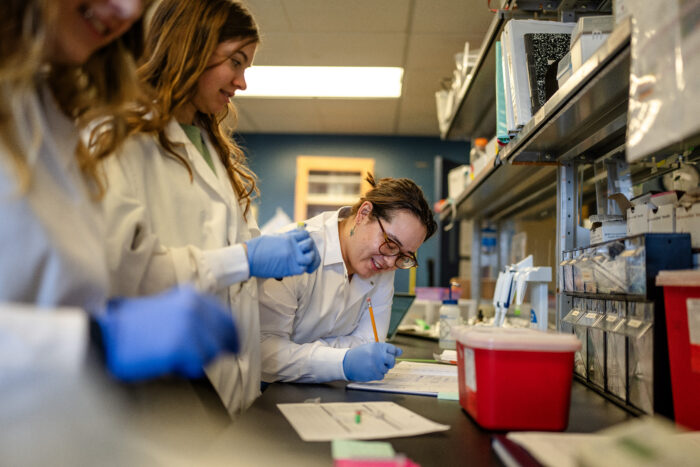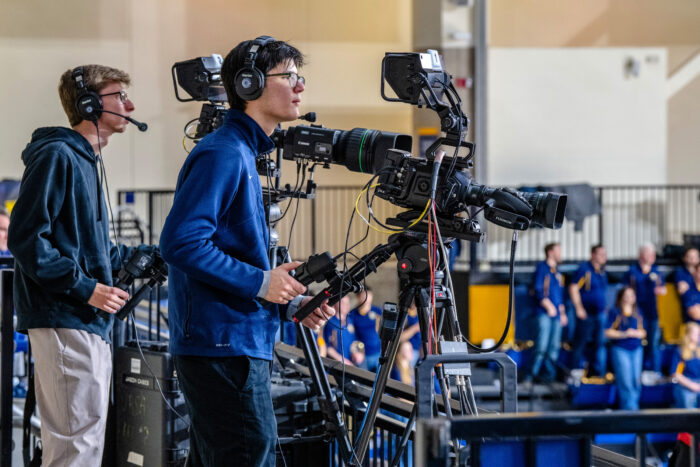Patrick Hollenbach spent four-and-a-half years working 12-hour shifts on the U.S.S. Hué City, fixing communications equipment and coordinating some of the guided missile cruiser’s most vital functions, such as its radar and satellite communications.
Despite his experience under pressure, Hollenbach still found life as a college student challenging.
“There’s a night and day difference between being a student and being in the military,” says Hollenbach, a student in Marquette’s Master of Business Administration program. “You’re going from a normal, regimented job where you can do whatever you want when you go home to having to study and budget your time.”
The Graduate School of Management is a popular destination for military veterans hoping to further their education. Veterans can take advantage of the GI Bill® and other tuition assistance programs to enroll in college at a reduced rate. Karen Rinehart, assistant dean of the Graduate School of Management, says that the college offers several programs that can prepare veterans for the next chapter of their lives.
GI Bill® is a registered trademark of the U.S. Department of Veterans Affairs (VA).
I didn’t want to be at a place where I was just another number and Marquette’s personal touch just felt right.”
Vania Veit, Executive MBA student
“Veterans have lots of practical knowledge that translates well to life outside the service,” Rinehart says. “We can give them crucial support as they transition into the civilian world. We also teach hard business skills to complement the leadership experiences they often already have.”
Vania Veit can testify to that firsthand. Veit joined the Marine Corps in 2006 and served for four years, including a deployment in Iraq, during which time she attained the rank of sergeant. After that, she was a medical technician in the Air Force and continues to serve in the Wisconsin Air National Guard. Veit is transitioning out of the military, and Marquette’s Executive MBA program is allowing her to make use of her military experiences in new ways.
“One thing I’d love for civilians to understand about us is that we’re diverse and adaptable,” Veit says. “We’re not just rigid soldiers — we come from different backgrounds, bring unique expertise, and our experiences extend far beyond combat. We value teamwork, thrive in collaborative settings and our strategic thinking is highly transferable to any field.”
Flexible scheduling is one of the primary assets that Marquette offers veterans, who often come to the university at different stages of life. Some, like Veit, decide they want an in-person experience. Others, like Hollenbach, work full-time and would prefer offerings that fit around their schedules, including remote classes. Adherents to both philosophies say that time management is crucial for success.
“You are taught disciplines in the military, but it’s really up to you to implement that in college — to do all your homework and to go to class when your life isn’t as regimented,” says Hollenbach, who is also a test engineer at Rockwell Automation.
“I have friends who have struggled with their transition out of the military because they didn’t have that structure anymore,” Veit says. “While the military provides a structured environment, it doesn’t mean things are easy or handed to us. From day one, we’re given significant responsibility and are expected to solve problems independently, with the structure offering a clear path forward. Transitioning to civilian life means adapting to a new kind of independence, where you’re responsible for creating your own path. That’s a shift that can be challenging for many veterans.”
Marquette’s heavy emphasis on student success has proven to be helpful in bridging this gap. All students are assigned an academic adviser to help them with class registration, graduate requirements and connections to other resources on campus. The university just opened the Lemonis Center for Student Success to serve as a resource hub for student services, including tutoring, career counseling, academic coaching and peer mentoring. The College of Business Administration offers similar services to all its students through the Swift Student Center.
Hollenbach and Veit are both on track to make the most of their Marquette degrees. Hollenbach is set to graduate in December 2026 with a specialty in finance, which he hopes will help him pursue operations management opportunities at Rockwell. Meanwhile, Veit feels that the EMBA program was a perfect fit.
“I was in love with the program from the first day,” Veit says. “Dr. [Kevin] Walsh and Dr. [Melissa] Shew, the people who run it, are amazing. I didn’t want to be at a place where I was just another number and Marquette’s personal touch just felt right.”
For more information on the Graduate School of Management, contact Karen Rinehart at karen.rinehart@marquette.edu or schedule an information session appointment.



